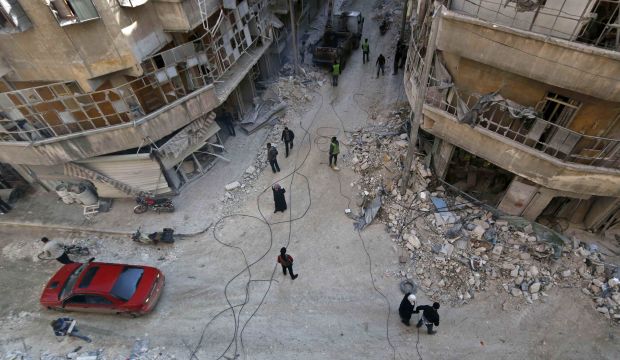
Workers repair electrical grids as civilians walk past buildings damaged by what activists said were barrel bombs dropped by forces loyal to Syria’s President Bashar Al-Assad in Aleppo’s Al-Shaar neighborhood on February 26, 2015.
(Reuters/Hosam Katan)
United Nations, AP—The Syrian government expelled two key UN humanitarian staffers because of their contact with armed opposition groups while trying to arrange aid deliveries—a decision that could harm a new effort to secure a six-week truce in the country’s largest city, the UN humanitarian chief says.
A message from Valerie Amos, seen late Thursday by The Associated Press, says the expulsions this month “set a worrying precedent for all humanitarian staff in Syria, in that any staff member in contact with armed opposition groups for the purpose of negotiating access is potentially under threat of being declared persona non grata.”
The United Nations and other aid groups have struggled to get badly needed aid to millions of people in Syria’s civil war, which moves into its fifth year next month.
Syria’s government has been blamed repeatedly for hindering the effort, which is also complicated by multiple armed groups and the recent rise of the Islamic State of Iraq and Syria (ISIS) militant organization.
Amos’ message to colleagues indicates that the effort to secure a six-week suspension of government airstrikes and artillery shelling in Aleppo is at risk. The UN special envoy for Syria, Staffan de Mistura, was heading to Damascus on Saturday to work out details on the proposed freeze in hostilities throughout the devastated city, which would allow the UN to test the delivery of unrestricted humanitarian aid to one district there.
“Whilst the Government of Syria is giving public support to the Special Envoy’s freeze initiative, they are making it difficult to actually implement it, should agreement be reached by the Special Envoy with all parties,” Amos wrote. “The Government has removed a key humanitarian staff member with the contacts to negotiate access with a wide range of armed opposition groups in Aleppo, and who was expected to play a leading role in the event that the freeze materializes.”
The expulsions also will have a significant impact on the entire humanitarian operation for Syria, as the two staffers played a critical role in helping to coordinate inter-agency aid convoys and maintained direct contact with key armed opposition groups for negotiating aid access, Amos wrote.
She said one of the two expelled staffers had extensive contacts with such groups in Aleppo.
Syria’s foreign affairs ministry on February 9 declared one of the international staffers, who was working in Homs governorate, persona non grata and had one week to leave the country, Amos wrote. That staffer has since left.
Then on Wednesday, the ministry declared that another staffer working in Aleppo governorate was persona non grata and has a week to leave, Amos wrote. The staff member is now preparing to leave Syria.
“Although no official reasons were given, and we are continuing to gather the facts surrounding the expulsions, it appears that the decisions were made due to their direct contacts with armed opposition groups for the purpose of negotiating access,” Amos wrote.
The news comes as Security Council members on Thursday expressed support for de Mistura’s efforts.
Even Syria ally Russia urged the Syrian government to “go the extra mile” to find an agreement with de Mistura on the Aleppo plan, which the envoy has said could be replicated elsewhere in the country if successful.
But US Ambassador Samantha Power warned that Syria’s government “has an abysmal track record in honoring its commitments.”
The Aleppo plan also asks opposition forces to avoid using heavy weapons, including rockets and mortars, during the six-week suspension period.
De Mistura is sending a separate team to Aleppo to assess conditions there, after which he is expected to announce when the six-week period will begin.
Syria’s crisis began in March 2011, with protests against the government of President Bashar Al-Assad eventually turning into civil war. The UN estimates that 220,000 people have been killed. Another 3.8 million have fled the country to neighbors including Jordan, Lebanon and Turkey who say they are overwhelmed.
On Thursday, the UN refugee chief, Antonio Guterres warned the council that “we are approaching a dangerous turning point” as those refugees find fewer places to go and make increasingly desperate attempts to flee.
He said Syrians made up one-third of the nearly 220,000 migrants arriving in Europe after perilous boat crossings of the Mediterranean last year.
“Europe must step up its capacity to save lives, with a robust search and rescue operation in the central Mediterranean, or thousands more will die,” Guterres said.
